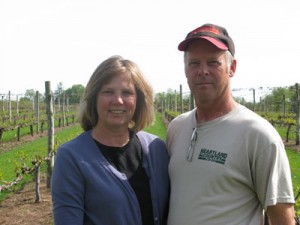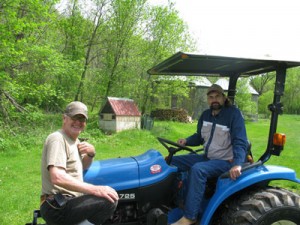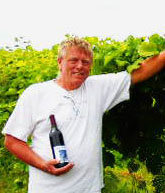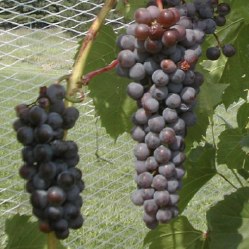Grape Production Expands in Vernon County Wisconsin
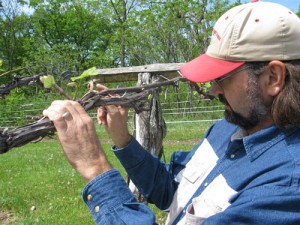
Tim Rehbein, University of Wisconsin Extension Agent for Vernon County, inspects a grapevine for frost damage
Timothy Rehbein, University of Wisconsin Vernon County Agriculture Agent, notes that at its peak in the 1990’s, tobacco farming was a thriving $14 million business in Vernon County, Wisconsin and surrounding areas. When the Wisconsin tobacco industry crashed suddenly in the late 90’s, concerned tobacco growers approached Rehbein, fresh out of grad school at the time, demanding alternatives to tobacco.
“The tobacco growers said, “Ok, what’s your idea for a replacement crop,” Rehbein recalls. “When I said grapes, I was afraid the tobacco growers would think I was nuts.” As it turns out, Rehbein was ahead of the curve. Today, there are over 20 grape growers in Vernon County and over 75 acres of wine grapes. Vernon County is also the largest grape producing county in Wisconsin.
“Grapes and wine were foreign to me and to the residents of this area back in the early days,” Rehbein said. But he had a hunch that grape growing would be a natural fit for tobacco farmers in Vernon Country. “Tobacco requires the farmer to be in field throughout the growing season, just like grapes,” Rehbein said. “Tobacco from the area also had a special taste and smell that made the crop attractive for certain types of chewing tobacco. Fortunately, the concept of local ‘terroir’ was something tobacco growers already understood and were ready to apply to commercial grape growing.”
In 2000, concerned that a request for grape funding would not be taken seriously, Rehbein applied for a $25,000 Agricultural Development Diversification Grant from the State of Wisconsin in the name of the Tobacco Exposition Board. The grant was approved in July of 2000 and the first Edelweiss, Foch, and St. Croix vines in Vernon County were planted in 2001.
According to Rehbein, much of the knowledge that started the grape industry in Western Wisconsin came from nearby Minnesota which was already growing grapes. During early 2000, Rehbein enlisted the help of the Minnesota Grape Growers Association to conduct weekend “grower schools” for farmers converting from tobacco to grapes. Assisting with those first grower schools were Robin Partch, winemaker at Northern Vineyards Winery, and John Marshall, a Midwest Wine Press columnist and owner of Great River Vineyard.
Also participating in the first educational programs for Vernon County Grape Growers were Dr. Paul Tabor of Tabor Home Vineyards in Baldwin, Iowa and the late founder of Wisconsin’s first winery, Bob Wollersheim. (Bob Wollersheim planted what is thought to be the first post-Prohibition vineyard in Wisconsin during 1972.)
Rehbein also arranged for the tobacco grower group to meet with the late Minnesota grape breeding legend Elmer Swenson. “The original Edelweiss cuttings in Vernon County were handed to me in a fistfull by Elmer Swenson,” Rehbien recalls. “When I asked Elmer ‘how much?’ he replied, ‘All that I ask is that you take care of them and make them available to people.’ That’s the kind of man Elmer was.”
Today, some of the original tobacco farmers in Vernon Country operate thriving vineyards. Ron and Karen Haakenson of Whispering Pines Vineyard in Viroqua were among the original tobacco farmers who converted to grapes. The Haakenson’s now have 3,300 vines on six acres including Edelweiss, St. Croix, and Marquette. Edelweiss is their best seller, some of which goes to Robin Partch at Northern Vineyards Winery in Minnesota. Yields vary by varietal, but the average is around six tons per acre. (Sources tell Midwest Wine Press that the current market price for hybrid grapes in Wisconsin is around $.80 per pound.)
“Having the support of Tim’s grower groups was especially important in the early days,” Karen Haakenson recalls. “We learned the technical skills for grape growing, like pruning, from the speakers Tim brought in and from the Michigan vineyard trips he organized,” she said. “Now we host pruning demonstrations in our vineyards each March where we teach new growers the tricks of the trade.”
Loren Cade, another member of the original group of tobacco growers, now grows 14 varieties on a 2.25 acre Vernon County hilltop some 400 feet above the valley floor. The vineyard is so remote that it must be accessed by farm tractor or ATV.
Although Cade was also the winemaker at Vernon Vineyards in Viroqua until 2011, he always wanted to grow grapes because he felt that winemaking was too time consuming. ‘My wife wanted her fishing buddy back, so I just concentrate on growing grapes now,” he said.
Cade’s total production is 13 tons per year. His largest varieties are St. Pepin, LaCrosse, Prairie Star, and Edelweiss. Cade’s vineyard was one of the first in Wisconsin to plant Frontenac Gris in ’06. Cade said he lets his Frontenac hang until late September to maximize flavor. Much of the Frontenac Gris harvest is sold to Paralell 44 Winery near Door County.
Wine grape production continues to expand in Vernon County. Bob Starks, the founder of Vernon Vineyards in Viroqua, which was sold in 2012 to a local owner, recently planted three acres of Frontenac to bring his vineyard up to 13 acres. This expansion may only be the beginning, according to Starks. He is now considering buying a $140,000 mechanical harvester because he has children that are interested in grape growing. “If the kids want to get more involved, it’s possible that we could have 50 to 60 acres,” he said. “More and more Wisconsin wineries are opening up, and they all want more local grapes,” he said.
Tobacco farming is now all but gone in the Driftless Region of Wisconsin. But sensitive wine tasters claim they can detect a hint of tobacco in the wine made from Vernon County grapes grown in old tobacco fields. Rehbein, who grew up on a dairy farm near Manitowoc, said he’s especially proud that consumers all over Wisconsin are embracing local wine and agriculture. “My perfect Wisconsin town would have its own winery, brewer, baker, butcher and market – all locally owned and sourcing local product,” he said. “That’s what we’re striving for because local food and wine is good for Wisconsin.”
Publisher’s Note: This February, Tim Rehbein won the Industry Award from the Wisconsin Grape Growers Association for major contributions to advancing the Wisconsin grape and wine Industry.
[wp_geo_map]


